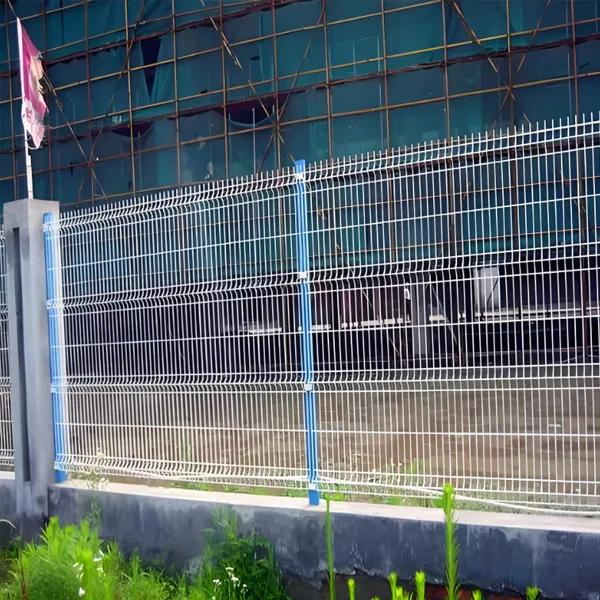Giu . 05, 2025 06:56 Back to list
Affordable Razor Wire Price per kg Premium Security Solutions
- Introduction to Razor Wire and Welded Mesh Pricing Dynamics
- Raw Material Cost Analysis and Market Data Impact
- Technical Specifications Driving Price Variations
- Manufacturer Comparison: Price-Performance Evaluation
- Custom Engineering Solutions for Specific Applications
- Security Implementation Case Studies
- Strategic Purchasing of Welded Wire Mesh: Price Per Square Foot Insights

(razor wire price per kg)
Understanding Razor Wire Price Per kg and Per Meter
Accurate razor wire price analysis requires understanding both weight-based (per kg) and linear (per meter) metrics. Global market rates currently range between $1.80-$3.20 per kg for galvanized razor wire coils, translating to $0.85-$1.50 per linear meter for standard 60cm concertina models. Zinc-aluminum coated variants command 15-20% premiums due to enhanced corrosion resistance exceeding 15 years. Primary cost components include high-carbon steel wire (constituting 40-50% of total material cost), specialized blade stamping processes, and anti-corrosion treatments. Secondary expenses involve precision coil-forming equipment requiring 350-500kW power consumption.
Spot prices fluctuate daily based on Chinese steel billets (current reference: $530-$580/ton FOB Tianjin) and zinc premiums (LME: $2,450-$2,600/ton). Transportation impacts final costs substantially – shipping a 20ft container with 25,000 coil meters from Asia to Europe adds $0.09-$0.12/kg surcharge. Duty structures vary internationally: while US imposes 7.2% anti-dumping tariffs on certain imports, African markets maintain 5-10% lower tariff barriers. These factors create significant regional disparities, with Middle Eastern quotes averaging 12% below European benchmarks for equivalent products.
Market Trends and Price Fluctuations
Q3 manufacturing data indicates 8.5% year-over-year cost escalation, primarily driven by energy-intensive production processes. Modern razor wire factories consume 8-12kWh per kg produced – translating to $16-$24/ton at European industrial electricity rates. Galvanizing costs specifically jumped 22% in 2023 due to zinc volatility, directly elevating razor wire price per kg
by 9-13%. Counterbalancing this, automated blade-punching systems achieving 1,200 blades/minute (vs. traditional 450/minute) yield 15% production efficiency gains.
Global infrastructure projects significantly influence demand patterns: Saudi Arabia's NEOM requires 3,200+ km of perimeter security annually, absorbing nearly 18% of Middle Eastern production capacity. Concurrently, US-Mexico border fortification programs consume approximately 9 million kg yearly. These concentrated demands create supply chain bottlenecks, extending lead times from 30-45 days to 60-75 days during peak seasons. Currency exchange volatility adds further complexity – 10% Euro/USD fluctuation alters landed costs in Eurozone by approximately $0.23/kg.
Technical Specifications Driving Cost Structures
Material gauge represents the primary price determinant: razor wire fabricated from 2.5mm high-tensile steel (2,550-3,020 psi yield strength) costs 28-33% more than standard 2.0mm options. Advanced coil configurations like 810mm diameter Triple Concertina deliver superior barrier performance but require 40% more material than standard 610mm models, proportionally increasing both per kg and per meter pricing. Military-grade variants meeting UL752 Level 8 ballistic standards add 60-75% cost premiums due to specialized heat treatment and thickness requirements.
Welded mesh companion products exhibit distinct pricing mechanisms. Prison-grade mesh with 50.8mm x 101.6mm openings and 4.0mm wire diameter averages $3.20-$4.10 per square foot, while industrial 152.4mm x 152.4mm configurations with 2.7mm wire cost 45-50% less. Critical technical differentiators include tensile strength (minimum 1020MPa for certified security installations), weld shear strength requirements exceeding 1,500N, and salt spray test durations (480-1,000 hours depending on zinc coating thickness). Automation-driven manufacturing advancements now enable welded mesh production at 100 linear meters/minute, optimizing labor costs which historically constituted 30% of total expense.
| Specification | Standard Grade | Heavy Duty | Military Grade |
|---|---|---|---|
| Wire Diameter (mm) | 2.0 ± 0.05 | 2.5 ± 0.03 | 3.0 ± 0.02 |
| Blade Thickness (mm) | 0.5 | 0.8 | 1.2 |
| Coil Diameter (mm) | 610 | 710 | 810 |
| Coating Thickness (microns) | 80-100 | 120-150 | 200+ |
| Cost Per Meter | $0.85-$1.20 | $1.40-$1.90 | $2.80-$3.50 |
| Cost Per kg | $1.85-$2.30 | $2.70-$3.20 | $4.80-$5.60 |
Vendor Pricing and Value Analysis
Leading manufacturers employ distinct pricing strategies reflecting their technical capabilities and market positioning. European producers like Betafence and Barrier Group maintain 22-25% price premiums over Asian competitors, justified by ISO 17799 certified quality systems and localized engineering support. Middle-tier manufacturers in Turkey and Jordan offer competitive alternatives at 12-18% below European levels, typically featuring 2-year shorter warranty periods but comparable material specs. Critical evaluation factors include production certifications (ISO 1461 coating standards), minimum order quantities (typically 5-8 tons for custom projects), and vertical integration capabilities – mills with in-house wire drawing facilities offer 8-12% better pricing consistency during material shortages.
Global shipping economics dramatically impact landed costs. A standard container holding 18,000kg of razor wire incurs transportation fees of $2,800-$5,200 depending on origin – equivalent to $0.16-$0.29/kg added expense. Projects requiring expedited 15-day air freight face 350-500% cost penalties, making accurate procurement planning essential. Analysis of INCOTERMS reveals CIF agreements typically add 9-11% to base prices versus FOB contracts, though they mitigate logistical risks for buyers.
Customization Engineering Solutions
Specialized barrier projects demand engineered solutions beyond standard catalog items. Nuclear facility perimeter designs often specify 90-degree blade angles instead of conventional 60-degree configurations – increasing material consumption by 15-18% and requiring specialized stamping dies costing $12,000-$18,000 per set. Coastal installations needing epoxy-polyester duplex coating systems incur 55-70% surcharges but extend service life to 25+ years in corrosive marine environments.
Hybrid barrier systems integrating razor wire with welded mesh backings provide superior intrusion resistance. A typical configuration features 1.5m tall welded mesh with 0.8mm diameter reinforcement wires (cost: $7.20/m²) supporting triple razor wire coils at 0.5m intervals. The mesh-wire interface requires specialized tension brackets adding $4.80 per connection point. Such integrated systems typically deliver 18% faster installation than separate deployments despite 15-20% material cost premium, achieving cost-neutrality within five years through reduced maintenance demands.
Security Implementation Case Studies
Dubai International Airport's perimeter fortification illustrates cost-efficiency at scale. Engineers selected Type BTO-22 razor wire with 2.8mm core wire and 200-micron zinc coating to withstand desert conditions, securing 60km of boundary at $185,000/km ($2.98/kg). The procurement strategy leveraged 8-container volumes to optimize shipping costs to $1.35/kg FOB Jebel Ali, while customized corrosion inhibitor sprays applied during installation extended protection intervals to 36 months instead of standard 18-month maintenance cycles.
Contrastingly, German correctional facilities prioritize welded wire mesh over traditional razor barriers. New generation FVK 1500 prison mesh with anti-scaling geometry and 4.2mm thickness provides superior cut resistance at $8.75 per square foot installed. Lifecycle analysis reveals 25-year costs of $0.35/sf annually – 40% below razor wire alternatives once maintenance labor and replacement cycles are factored. Security redundancy tests confirmed 43-minute delayed penetration times using hydraulic tools, validating the design choice despite higher initial material expenses.
Strategic Purchasing of Welded Wire Mesh: Price Per Square Foot Insights
Optimizing welded wire mesh acquisitions requires analyzing both material specifications and procurement variables. Industrial-grade panels (76.2mm x 76.2mm openings, 2.0mm wire) currently range from $1.90-$2.60 per square foot depending on zinc coating thickness. Large-scale infrastructure projects achieve 18-22% discounts through blanket purchase agreements – a $3.5 million highway project in Texas demonstrated $0.19/sf savings across 185,000 sf installations through pre-negotiated steel indexing clauses.
Technological shifts influence costing models: robotic welding stations now produce customized mesh panels with zero setup fees compared to traditional $400-$700 changeover penalties. Simultaneously, corrosion protection breakthroughs allow 38-micron nanotech ceramic coatings to outperform conventional 100-micron galvanization, cutting material expenses by 12-15% while delivering equivalent 15-year lifespans. Global supply chain diversification proves increasingly vital – establishing procurement channels with multiple manufacturers across Europe, Southeast Asia, and North America provides 35-40% improved quote competitiveness during regional price surges. These strategies position buyers to leverage razor wire price per kg and welded wire mesh price per square foot dynamics when fortifying critical infrastructure.

(razor wire price per kg)
FAQS on razor wire price per kg
以下是根据核心关键词创建的5组英文FAQs,使用HTML富文本格式:Q: What factors affect the razor wire price per kg?
A: The cost per kg varies by material grade (galvanized vs. stainless steel), supplier pricing, and bulk order discounts. Market fluctuations in steel prices also directly impact costs. Typical ranges are $2.5-$5.5/kg for standard galvanized types.
Q: How is razor wire price per meter calculated?
A: Price per meter considers coil diameter, blade density, and wire gauge. Vendors convert kg pricing using the product's weight-to-length ratio (e.g., 1kg ≈ 1.5m). Expect $4-$9/m for commercial-grade installations.
Q: What determines welded wire mesh price per square foot?
A: Mesh size (grid pattern), coating quality, and panel thickness drive costs. Standard galvanized mesh costs $0.15-$0.30/sq ft, while PVC-coated options reach $0.50/sq ft. Volume discounts reduce prices for large projects.
Q: Why is razor wire priced per kg and mesh per square foot?
A: Razor wire's weight-based pricing reflects material costs, while mesh area pricing accounts for structural coverage. KG measurements suit coiled products, whereas sq ft simplifies flat panel calculations. This aligns with industry purchasing conventions.
Q: How to compare razor wire and welded mesh costs for fencing?
A: Calculate total coverage: mesh costs scale with surface area (height x length), while razor wire costs depend on linear footage. Typical 100m fence costs: $500-$900 for razor wire vs $300-$600 for mesh, excluding installation.
-
Weather Resistance Properties of Quality Roofing Nails
NewsAug.01,2025
-
How Galvanised Iron Mesh Resists Corrosion in Harsh Environments
NewsAug.01,2025
-
Creative Landscaping Uses for PVC Coated Wire Mesh Panels
NewsAug.01,2025
-
Common Wire Nail Dimensions and Their Specific Applications
NewsAug.01,2025
-
Choosing the Right Welded Wire Sheets for Agricultural Fencing
NewsAug.01,2025
-
Anti - Climbing Features of Razor Wire Barriers
NewsAug.01,2025









